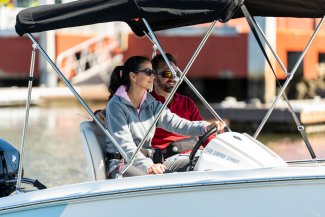Boating in cold weather presents some unique challenges and hazards to boat owners. The weather can be more extreme, and the stakes become much higher if you get into the water because hypothermia can set in in a flash. Being prepared and having the right equipment and knowing what to do when an emergency strike is crucial.
Below, we’ve collected some of our best tips for dealing with cold weather while boating. Read on to learn about the types of equipment you’ll need for cold weather boating and the essential gear you'll need if you get into the water. If your boat needs parts or services, stop by Gordon Bay Marine. We’re located near Muskoka and Toronto, Ontario, and we proudly serve Lake Joseph area as well.
Hypothermia
The main concern when boating in cold water is hypothermia. Hypothermia can set in in a matter of minutes. You can get hypothermia even when you don’t fall in the water. If you don’t have a place to warm up, you could be in big trouble. Your only lifeline will be the clothing you’re wearing. Investing in good equipment isn’t just a good idea, it could be the difference between life or death.
Layers, Layers, Layers,
The key to dressing for cold weather when you’re boating is layering. As the boat moves around, the cold of the wind and the splash of water will cause you to cool down extremely quickly if you aren’t properly dressed. Your outer layer should always be completely waterproof. Although it might feel somewhat stuffy, that’s a much better situation to be than covered in cold water after a wave washes over the side of the boat. Underneath that, it’s helpful to have a few different garments. If you get too hot, you can remove these under layers to cool off. That way you’re still protected from the water, but you’re more comfortable.
Footwear
Choosing the right footwear when boating is important. If you’re going to be working, you’ll want some waterproof deck boots. These boots are designed to maintain grip even on wet decks. They go farther up the leg than normal boots, which helps to keep your feet dry when there’s lots of water on the deck. Spending much time outdoors when you have cold feet is truly unpleasant, so make sure you invest in decent footwear. You’ll also want to try the boots on with your pants to make sure the two work together because if your pants don’t fit in or over the boots, they’ll bunch up on top.
Survival Suits, Float Coats, and Life Jackets
It’s always important to have a floatation device when boating, and when the weather is cold, you have a few more options. A standard life jacket will at least help to keep you up in the water. If you wear it under a waterproof suit, it will buy you a little bit more time after falling in the water. But a life jacket is far from the ideal if the water is really cold. A floatation coat, otherwise referred to as a float coat, is a better option. A float coat basically functions as a normal coat and can be worn whenever you’re on the boat. It’s waterproof and will keep you warm. The best piece of gear you can be wearing after falling in the water is a survival suit. A survival suit is designed to be totally waterproof and insulated, and it also offers extra buoyancy. Some survival suits even come with an emergency locator beacon to help rescuers find you.
Boating in cold weather poses some dangers, but if you invest in the right gear, you’ll be in a much better position. It’s also important to keep your boat adequately maintained. Your boat breaking down poses a major threat to your safety. Stop by Gordon Bay Marine for your routine boat maintenance or for bigger fixes, too. We’re located near Muskoka and Toronto, Ontario and we proudly serve the area of Lake Joseph area as well.


